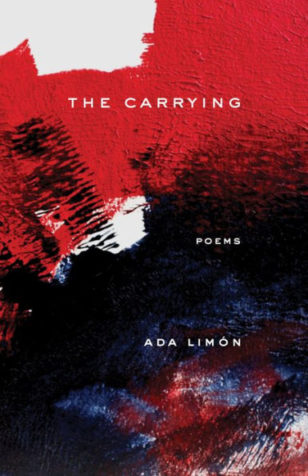Ada Limόn has described her fifth book, The Carrying, as her most autobiographical. In poems rich with earth — birds, beetles, gardens, deer, trees, plants, snakes — she considers the body and its weaknesses — vertigo, infertility — while probing larger themes of grief, joy, womanhood, love, time, death, and extinction. Of the moment and yet lavish and timeless, the poems together paint something of an illuminated manuscript of a life. “What if, instead of carrying / a child, I am supposed to carry grief,” she asks (“The Vulture & the Body”).
 Personal though the poems may be, they are also deeply attuned to the wider world. As Limόn explained in an August 14, 2018 “PBS News Hour” interview, her title The Carrying “could be the weight of history, it can be the weight of the current moment, it can also be joy and love … I wanted to point to the human capacity to carry many things at once.” Limόn’s poems do that and more, embodying the power of art in times fraught with private — and public — vulnerability.
Personal though the poems may be, they are also deeply attuned to the wider world. As Limόn explained in an August 14, 2018 “PBS News Hour” interview, her title The Carrying “could be the weight of history, it can be the weight of the current moment, it can also be joy and love … I wanted to point to the human capacity to carry many things at once.” Limόn’s poems do that and more, embodying the power of art in times fraught with private — and public — vulnerability.
The strength of this collection is hardly surprising — Limόn’s fourth book, Bright Dead Things (Milkweed Editions 2015), was a finalist for the National Book Award and the National Book Critics Circle Award, and the distinct voice and conversational style of these newest poems will be familiar to Limόn’s readers. None are more than two pages long, most are a page or less, and there is little out of the ordinary here in terms of form, with the exception of a few epistolary poems, the product of poem/letters between Limόn and poet Natalie Diaz, a collaboration that has received attention in The New Yorker. There’s an unaccountable ease in Limόn’s style, the way her poems establish intimacy with the reader right out of the gate, drawing us in with a simple statement, an anecdote, a question, casually addressing the you, the we, the lover, the dead, even the caves of California’s Mammoth Caves, before they dig deeper and make the turn for home. Appropriately, horses and their huge hearts run through Limόn’s poetry.
One of the many pleasures of Limόn’s work is how she nails not only endings but beginnings. Will I ever look at a bee again without thinking of the opening of her poem “Dandelion Insomnia”? “The big-ass bees are back, tipsy, sun drunk / and heavy with thick knitted leg warmers / of pollen. I was up all night again so today’s/ yellow hours seem strange and hallucinogenic.”Limόn has said she composes aloud — and perhaps it’s this seeing with her ears that jumpstarts so many poems, sound rolling off the tongue.
While the style may be familiar, Limόn has gained more power and heart in this collection, perhaps as a consequence of her (and the country’s) struggles. The poems have steely cores tempered by disappointment and grief but also love, humor, joy. As she jokes in “The Last Drop,”
My memoir could be titled, Everything Was Fine Until It
Wasn’t. My memoir could be called, I Thought I Wanted a Baby But
All I Got Was Your Dead Ex-Girlfriend’s Two Old Cats.
Limόn doesn’t hide her anger — personal, political — or her humanness, her desire. Yet, there is a meditative quality to these poems, a way to see through suffering and loss. Take the birds in “The Year of the Goldfinches”:
There were two that hung and hovered
by the mud puddle and the musk thistle.
Flitting from one splintered fence post
to another, bathing in the rainwater’s glint
like it was a mirror to some other universe
where things were more acceptable, easier
than the place I lived. I’d watch for them:
the bright peacocking male, the low-watt
female on each morning walk, days spent
digging for some sort of elusive answer
to the question my curving figure made.
Later, I learned they were a symbol
of resurrection. Of course they were,
my two yellow-winged twins feasting
on thorns and liking it.
![]()
![]()

Yes— “feasting / on thorns and liking it.” After all, as she reminds us, aren’t we dead stars? “The Raincoat” begins with Limόn as a child getting treatment for her crooked spine, but transforms into a lovely poem about her mother: “My god, / I thought, my whole life I’ve been under her/ raincoat thinking it was somehow a marvel / that I never got wet.” Limόn lives mainly in Kentucky now, not her beloved California, nor her adopted New York, and suffers with vertigo, which sometimes leaves her unable to write. Trying for a baby, she struggles with fertility and fertility treatment in various poems, eventually coming to terms with what she’s called her “child-free” state:
What would I
do with a kid here? Teach her
to plant, watch her like I do
the lettuce leaves, tenderly, place
her palms in the earth, part her
black hair like planting a seed? Or
would I selfishly demand this day
back, a full untethered day trying
to figure out what bird was calling
to me and why.
(“Sparrow, What Did You Say?”)
Like Limόn’s body, her country has revealed its vulnerabilities, its failings. Many of these poems appear to have been written during or after the 2016 election, and something of the shock thrums through them. In “A New National Anthem” she wonders whether “every song of this country/ has an unsung third stanza, something brutal/ snaking underneath …” Yet, Limόn longs for a more generous song, “the song that says my bones / are your bones, and your bones are my bones / and isn’t that enough?”
These are poems that go for the jugular and the heart, poems to read and re-read — to find out all over again what happens, to think about how to be. As Limόn writes in “Dead Stars,”
Look, we are not unspectacular things.
We’ve come this far, survived this much. What
would happen if we decided to survive more? To love harder?
[Published by Milkweed Editions on August 14, 2018. 96 pages, $22.00 hardcover]